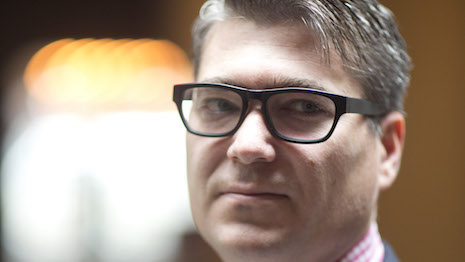By David S. Friedman
Millennials have captured the attention of every luxury brand in an attempt to increase their mindshare with future purchasers. In great irony, most of them cannot afford what luxury brands are selling and most likely in the future, may not buy into the existing brand narratives around exclusivity.
Most of the attempts of luxury brands to increase their mindshare among millennials has centered on leveraging social media and positioning their brand around impact and nonprofit themes. And the very advanced brands are using marketing strategies that allow the millennials to see their own mirror image as central and core to the unique narrative of a particular brand.
Stuff it
By all indications, the future may show us that millennials may not even believe in owning assets from a lifestyle perspective, which would directly refute the nature of owning a luxury item.
In this case, Patek Philippe's legacy positioning would certainly fall on deaf ears. By all accounts, the millennials form the core of the "sharing economy" and the world of commerce has been fundamentally shaped by the ownership assumptions underlying Uber and Airbnb.
It is not hard to imagine that BlackRock's portfolio of tens of thousands of houses they purchased during the downturn would be the ideal housing platform for millennials to rent for the rest of their life and either increasing or decreasing space when needed but never actually owning a home.
Ironically, there is a shift away from assets to experiences among the ultra-high-net-worth (UHNW) as well, in a not-so-connected parallel path.
Time for change
The 2017 WX Camper Nicholson report highlighted that to engage the UHNW for luxury purchases on the very high end, the shift should be made from focusing on the asset to viewing in their case, specifically, yachts as platforms for luxury experiences.
This strategy is the same for millennials even if the motivation and drivers are different.
Against this backdrop, millennials may be the first generation to possess no assets.
Luxury brands will need to morph around this reality and develop new business models if they desire to capture millennial marketshare. For example, paying a monthly fee to swap various editions of luxury watches "in" and "out" on a monthly basis.
THE KEY foundational reality is that millennials will be willing to pay monthly fees which is part of their shared economic reality and that everything they use on social media and music is in the cloud.
As Rent the Runway has positioned itself as "your closet in the cloud," luxury brands that wish to be successful in engaging millennials will need to figure out what it means to have take their exclusive products and put it in the "cloud."
David S. Friedman is New York-based founder of several ventures in the wealth intelligence space including Wealth-X, WealthQuotient (UHNW sales training; http://www.mywealthq.com), Premex.io (UHNW digital advertising platform) and ProspectGraph (integrating omnipresent prospect and client intelligence across the digital and physical Web). Reach him at [email protected].
{"ct":"SuoBk63TnTWlmmMKN+gIFtQyD541rN7K+bQgoTMI3cs1CyXkDhfmDrcau+iKVqVzMSOQadqZozKh5x3oZPakV\/Ddbv\/07JetZqyBtCoGdvUZW32d8ZJN1S7vL3XsP74IkAx8H1n8HghtiQwbOdjSgpYRebTmbWD9VKVCCKJyr\/R+L8ioesBdZj+QXMaKFq\/lBklUwmUf\/TTFnBbZkmLefdnZSG+sEb+\/54ZA69lUhgcbYXWESu5aEAfWV4nTGNsfxAg7pbVbbRXfW60fJx+u2ZyzZ5OBVv6XUIxLa\/pQW2j5FK1+QEvk9CNFTzbcYyoDinSxKdZY\/Sj6BUTCiWbp9wDg0VWXozDzrWvIZHhBtDa2aGxbWeyNKyxNHCTBBuAlaNH3CBUcGKaiFs4NtLwkx5caRH\/s\/F0UkObFLccIlRzxekvzN0fZDI\/NUHrbTkdXv84bdv1\/KxDP1FYt1QEVNtS+NJq6omdtCOzJR1XcA8w+qBE\/n50VvlttF9NK+yTvyzRizOS0LHU2KJ7CfAoVBk0r8ijhCRxxbSnXL3RzgdwaPxoon6+g\/dsihpm1j8HcB5srvJZ7BMobsFh3ShMzCRM3OfGp5tVcmLsRc5WuqMBGAEwjw+dRcY45QU+92jKSyu8yhEFtNP5IIlrwUzuHw4JO4qomwbtFgnQfXencX+Ix7PjCPd5mz51X7oCt+nTQe9UncQzhiKcF\/F+MSfsXOvLJpdCb57oaIpuy\/KjNS3DUt+Zo8ou0tUd3K4dRYUVNX+YaX9D8QLWByMadwyepINs\/N3PQPsmvZ\/lo5R2d\/N9iX6gORtsQtSUCPPdTrq782741KfU2iRnOFYNkPq4AIHXADULp3tlA0lEYOSYCrhbHgMgUQpu5u6lLyqxpQzkR+YvUYhSO7XBJd9BoYUPo30j8iIv8QoFBQDy8yyYTPa02sOzsV6k\/NUmIfAzCOOZcMsK3U9wTbiIq+DJCPsc6ghDevlsNlFeq5F2I6jORTW5sLvQnY0F9rxCZl328Z7h9s3yCghBYwMCO\/fi\/vRfpybE1qqaZ6n2cKIuwsetxhupDv1mY6S2oDOcpoNwJYh0qqPPE4B4zJjD3LSJxDkTLTEHyKc6Wi7Pv5\/nI+fZmmk3ExbrmUXT7KoIevkfoD+g6KnqVRf3cpB9MqDzrljLuzlEDab11NxwO1879vVaW6lW45HOKl\/GDbY58LN3lCbet4LPT4Y0JXmDT\/rqr6zT7BdXwJiXEOfu47C6Oq8JZavBK1ag44+IPmUgfSIBPCXeTfAKFqhX6PGf175h0UofqUrxndD4xNAnrZ4pWm+7LmFYZSExJyAS3rd04vtTlbfVrgt2cSXeaDzxNeOQplh0hMIkcYZpvrtvEiQkPgP9MsuD3gnsKC9TG5zSRFvhWtiG\/uExGiHBjb3HswswNs4DMSQb6iEoPb\/n9yZqzDicoP7TV0S0nFpjxTMGWCVyUql4Ed7N20m\/olKXvi0iueWIAAL0tbROOYatmlqHzomjE\/11sRfGfC0RFUlQn5F5G8i552FqFDnbAhhh0YkKReVaNEZn9BBOwRpHvpNeQuvtDYvzvn3mulDthQaDE1qUX2QizUOJe3QUsdzyqOAn5Q6R\/leKxTaMRmKSOCPHhV3Hx7vD5rC0bGYh1EJUlW8oTvLJQW6XCaICX\/XeQW4q9K2bZVkc4j5bHA+a3sulhSAotdkNFLrsus7lDzw4meqkXqKQMFzOhp5KpcU5h6Q6y1Tej41Vc\/dmfCfW865kDU5GwhC43VASpj5In72Im644thuCLIHnemIuiNOT3n2bKCYMHGty7yVSC6G4B35JGNg9Fcepnw05QeOTCTOZWSjkf4jTFvVGMQf3cpG6R7icM0aPhDsmWHJdJlvwgVJVGRguOHFzZDhZeQbVdk0yv8jI7hiXJRpCfPel03zdAa82tVglrRKIkSowAQWrlifE0iuL4SJNxtxv1E5qgxadpUHI\/3DXUBeXhUudZExDwkgq1HJe4RIl0yLNWu12jwWUWJ843k\/qX\/q9AvTyPK1n6ow5YcXhaIBivFyJjXQmI4JddxdifIu3KFZa\/dQfmSTbed25puXrTxtmb0barGhjeXla9ugc8M8nOY31mLWK5CR60ohvpYLTBus\/pnVZQNrI9L84yEP\/DpZigHodhXE+lmilXHUjbo3XDEVNqQQ0HpSfKlvnsUa2eEFcC1v7hCv3xrjorlhHguxhIQ5ys1TWIUzt8huheu1Cq5a3GR3w9EZcQfi1jenD5s+oM36liLU8gi0UhoduLOfcBxMVFCufJz\/QN\/EbpJ6kcBW40ffVJ5EFH+pxt0d8KPw63G5jkgs8lBRA7oz9c3Xv9soG3VKVuK63kgJ+bozOJEKYgk2xDuTrbMAqJCWDH62oz7o40FxNEtFyL7S4X43kvszT5q75bL73tKbRQa4FJB9XVj6HTzD8vgNr8MisLO3HUTPfqhLOU5CXnql+nPJnhUG\/wdD9kqyVumtOLbzr9kHLBMLStupvHO5ClJ9WoKxRo+myK4KDi5NDYabp3JsKne9GRr6R5JKzvl3TXVKuu\/0F3CwJor\/fdpVziU3SMAGzt0H4FsMWaQJZSdpyWuEJOW32SdAs+60qu3ipTMShMFETKVQX9OmuOEQQCSwxBIIaRmTSxC58q0thFquY8NRZ91G6UmzHJKxC0ZqJPCHBeIT7z+Vt9NHpkW1OzyyeWNt\/uSGvZvgAUcXOvLAtrzAPPPasMlxffkBN3TAOcVLGcvL6bhpKosKi1\/sGJ0vbOkcqFHRdho9\/FONovzROg2ygTKZ82OgfoxT7h7YsAO8w\/gcEpByZkRux+cyoIks3YfJcXhwVaIfkhmhA7owjS\/MmALFz1e\/epDYEd0lzFqVSQFQkTozbJcQz+AoojHf90s6BGLYSFZdfVaY\/eEvh7YDkhh3Pje3TUOTYNqGLIlhfi6rqUYBYKjaprzzi708gzYO6w6Glv\/fN3nV\/f94LHbn5bjMalAcx6XKszLyKfj2hnc0WTZZAO2Q\/1DLcZM4ELRg3GKAvvoOAQGe1kyKPBrqSljBWlcWW7VboL0qouIGMQe0ANOQ7Au3h1+3c3qGMk7crlq8rBpTLL7n9phn+RNhPNXtd6rw1wSlS9oMXMGsF5Den863ZCwymOWIO7HPDV9gNNnkcUXJ9vKCNbKr5g4VWxfj+wwAQa2vS3Y\/Jpd9IJOthJgd4\/4XEdCJaz5QBvEf312yuAcYyq71w4zpyq9PuBQJq\/O7+pE8zydpQA3gNusF7HHha8lDZ2tCQWBADtk3o146ayUSI4oWKNKG++i\/s18H44R5AQnSGQd0WW1ks51GW6BosvdEojWWz3f3rmIW0Vwv6EzSWinjGIDd3wB2GmtgoRFE1usY9v0ucgSvTFvBhTGNNcBxrI4Nhmmy2mMvyqO\/gtlttg\/7PDBpwI7bVXzeT+3bn6LnjhsMm+oMmH+oIlYxSPC03KtB3UxHWJjcH5vJZIAGcNrZi4zphrUGR3Yfb9nQkFE374Je3ZpwstYj5MmSb5Eabpl\/CeGDQ2z3zd6\/mCBLL5bk0hKdMl7GkrilKP9v5zx36Ht09xCUeU2aSikpCXHF7\/R0R2ZSFK1nA11YusCCOgMTflwAX+UU8rszjvqvkZ9Es5RJKZt9Eh8if3uMPUjKOIERuVurDcg8fA3A+xUUim+b+hugDeP3XbU1SqXCOTexKGkUPh3iZXirUfdNkj1ba7rC5dDQ1XXTAxAwmvoiksKkh2MyAq5Oqd2hUPAjy0ozF94U6oewB7O1nafc0a3FGJIVx3ZfDCUupTBDnIMbYsd\/O0qFPl5WPMCq8bTM9wo1SNHgaAhA4mIB4oJG+5BjaaGbYGWPlA\/VVjtqLAK+yNUl+XpJXRXCeYsL\/XLtxJh1Z7r1QhEdQpaDO7qY6xyQHq0exbLi0L8U+83rrvGCPL24l07s7c4CjEMH9UsvopaYDl2\/EybgWDPKI9ICOxfRyDAVSzsjmXp5aHF9UkKLa1HBXhu5h7AEBt9QepRmI0SxsFgfnDqIQQojpx6B2hRVidh87oduYVieoWceRP2krSOlXFnKNNT4rZQlomLQHX79BGeZPfEelZHRFlndv87E4gk5aIgYCbpMnjrhC3euggqNQKMzeWK0kDQF5+SzoF8jReLP42YcJTRAZm71UqGQoY6fIKqTEnhVX1GSiUsysvnGMb3VZxE2rWsIJ8dMMwfAazJIpnSqaDitRgLkBnQ\/KyciJyzIBmwIkn7EWwl7QPey4+3HWGoXfg7\/NhCiSOufkjhS9ccltVBeI6F2l4hfIR6Qd3h7BSKFJz+H\/HUMbmEouOGGmDuopbOYlEWHHCFY+7I6C2ekHjhXfXtmhFp3gLABq8HISEKCDk3eeXSEUcIfcNsi7obU7dWexQmSd5mAyA+\/08fVBesCUTfrnZwJPXwlmVU\/1ipZ6\/6UPJJ0QeblWBhoQoWbUfUm67q3k5uYiqYO9YT5hPWWlg429ZclBcZmQNEp\/BrEIGdfEyNd4pXHY2RCv+e3gnQwVcuNYo3ziFAcZs5Shf3S79u02saEBh4d6RV+jdu19gaqHVgalsTkm0Amr90J22qBJxQzHfg5g0TrXmqhKnGppkICA7Lh0j80n958VzktItGZAECnrDifyo5wKJx7Nbj\/bkO+lQCkhZ0zFx7e4njVEGL\/LEVE4OCdG46NmghknKMMLio0jRc3qaovftstRPnqHmPbEqXMGk3z0PBIOYwiZMzaA+O5qsbmsM+2ZytU4SlEM8c1p0LK1fjvOh\/vIpAsNorh7FlIFedxD0ZmBp1N0xiNPLwWKgnWbmHfwhQm1PIQVfB1MHmgTCme\/auMUcT+h\/OEW\/6m5A6EPbncTmA\/Gb09xcpxbGqMHM99L+gepyQPgxQLmhhMWyDtZvhxEMiut3xwZvkKOUtcOh3UUm7c2RoWuHeqxOBRETrltIuhrv\/aqb12ANGhv20j2DVx2DaVYHnljkqb+X2zGQHmvWG5fbG2Su1pr19I4+304iSr+zXr5MNnrg2EgV57g01Xcg88iHVEPkmtkboHSCpsWg0VCGOrkcB08pXzhUig==","iv":"2f3ae7bd59591d12ea9c267d3d202859","s":"9b991f828c201620"}

 David Friedman. Photo: Michael Falco
David Friedman. Photo: Michael Falco